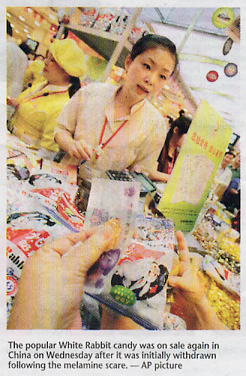Better for us to be food sufficient
Professor Tan Sri Dato' Dzulkifli Abd Razak
Comment
New Sunday Times - 10/19/2008
THE melamine food contamination issue, though not dominating news headlines any more, is far from over. Chinese baby formula tainted with the toxic substance is really the tip of the iceberg.
Of late, we have read of other food categories that were also contaminated, including vegetables, fruits and other types of candies or snacks, affecting no less than 40 countries.
Though there have been many test results claiming that certain food brands are safe for consumption, there are still many others that could be on the "suspect" list.
As melamine is also widely used in manufacturing plastics, paint, adhesives and food packages, data suggests that melamine might enter food through natural surroundings and food packages.
This, therefore, adds to the difficulty of ensuring complete safety of food products.
Another facet of the problem is where to draw the line, especially for products that are imported from China and then repacked locally. Worse, when they are then re-exported to a third country under different labels.
To the consumers, these may appear as local products when in fact they are not. Adding to this is, of course, the ambiguous interpretations of the safety limits of melamine, if there is such a thing.
Some concede that a small amount of melamine might be found in food and that it would be "unreasonable" to suggest zero-melamine in food.
Comment
New Sunday Times - 10/19/2008
THE melamine food contamination issue, though not dominating news headlines any more, is far from over. Chinese baby formula tainted with the toxic substance is really the tip of the iceberg.
Of late, we have read of other food categories that were also contaminated, including vegetables, fruits and other types of candies or snacks, affecting no less than 40 countries.
Though there have been many test results claiming that certain food brands are safe for consumption, there are still many others that could be on the "suspect" list.
As melamine is also widely used in manufacturing plastics, paint, adhesives and food packages, data suggests that melamine might enter food through natural surroundings and food packages.
This, therefore, adds to the difficulty of ensuring complete safety of food products.
Another facet of the problem is where to draw the line, especially for products that are imported from China and then repacked locally. Worse, when they are then re-exported to a third country under different labels.
To the consumers, these may appear as local products when in fact they are not. Adding to this is, of course, the ambiguous interpretations of the safety limits of melamine, if there is such a thing.
Some concede that a small amount of melamine might be found in food and that it would be "unreasonable" to suggest zero-melamine in food.

This is, however, not to say that melamine is entirely safe! The so-called limits were devised purely for purposes of comparison to avoid purposeful adulteration and contamination. That is why many health authorities in fact banned the substance in food products.
Reportedly, the World Health Organisation (WHO) and Food and Agriculture Organisation (FAO) are advocating an absolute ban on human foods contaminated with melamine and melamine-related compounds, as proposed by Vietnam's Ministry of Health recently.
After all, in general, melamine has no approved use in human or animal food. In the body, it will combine with other chemicals in the body to form crystals that could damage the kidneys, and this could prove fatal. Other problems include bladder and reproductive organ damage.
Some activists have even claimed that they don't think anyone knows what the "acceptable" dangerous levels of melamine actually are.
Indeed, Republican Rosa DeLauro, who heads a US House subcommittee that oversees Food and Drug Administration funding, said that to establish an acceptable level for melamine in food is an attempt to convince consumers that it is not harmful.
She was quoted as saying: "Not only is this an insult to consumers, but it would appear that the FDA is condoning the intentional contamination of foods" (Los Angeles Times, Oct 15).
More importantly, the incident has raised the question of food security in many countries where the effectiveness of monitoring is a cause of concern.
This is especially so when it involves imported foods which may pose many potential dangers.
Here, even the FDA is not spared. What is more, where there is not only a lack of regulations and standards, there are also problems of having qualified laboratory personnel to provide the required level of expertise and confidence to ensure food safety.
More often, it is chance rather than systematic and strategic monitoring that leads to the discovery of such tainting of food on a large scale.
For countries largely dependent on imported food, the question of food security has become even more serious, as the current event seems to show.
Imagine how national sovereignty and security can be totally jeopardised if imported food is deliberately poisoned, made worse by a lethargic monitoring system.
Because of such problems, we must ensure the move to be self-sufficient in food is not allowed to fail as it could be a threat to the entire nation.
